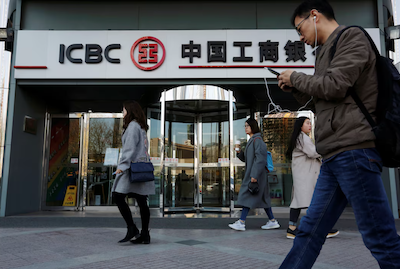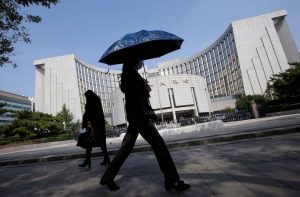China’s big five lenders have revealed shrinking net interest margins (NIM), as they warned of the risks posed by the country’s property sector crisis.
Amid a slowing economy, China’s lenders are under pressure to reduce interest rates on the loans they make to bolster flagging sectors as demand for lending falls.
On Thursday, China Construction Bank Corp (CCB), Bank of China (BoC) and Agricultural Bank of China (AgBank) all reported sliding margins – a key gauge of profitability – in their annual results.
“Profitability will remain under pressure with high credit costs and narrowing NIMs because the low interest rate environment keeps a lid on asset yields and investment returns,” Nicholas Zhu, a banking analyst at Moody’s, said.
Also on AF: Yen Fears Drag on Nikkei, Hang Seng Lifted by Policy Bets
On Wednesday, the Industrial and Commercial Bank of China (ICBC), the world’s largest lender, and the Bank of Communications Co Ltd, also reported smaller margins.
Bankers warned of ongoing risks in the property sector. Wang Jingwu, a vice-president at ICBC, said at a press conference held a day after its annual results were published that the bank would help stabilise the property market. Wang did not specify what kind of support ICBC would provide.
ICBC and BoCom, which kicked off the earnings reporting of China’s five major state banks, both posted barely any profit growth in 2023 amid slowing economic growth.
AgBank and BoC both posted slightly sunnier 3.9% and 2.4% increases respectively in 2023 net profit. CCB said net profit was up by 2.4% last year.
Volatility in China’s property market, which started with policies aimed at reining in developer debt, has seen defaults and failures at several property firms, hurting the sector’s financiers and leaving investors wondering whether state-owned property firms will get more support from banks versus privately-owned ones.
Chinese regulators are pushing banks to speed up approvals of new loans to cash-starved private developers, it was reported earlier this week, amid reluctance by the lenders to deepen their exposure to the ailing sector.
ICBC “will treat property firms equally, regardless of their ownership”, said Wang.
Small Regional Banks Vulnerable
The property sector and its woes were also a focus for the Bank of Communications Co Ltd (BoCom), which posted a higher proportion of non-performing loans from property firms on Wednesday and warned of risks to asset quality.
“The pressure on asset quality control is significant,” said Yin Jiuyong, BoCom’s vice president, adding that the bank “should step up risk control” of its property-sector related business.
BoCom’s non-performing loan ratio for real estate lending was 4.49% at the end of last year, rising from 2.8% at the end of 2022.
Meanwhile AgBank said that its bad loans mainly sprung from the property sector and local government debt.
This year, the weakness of the property sector is expected to add pressure on banks’ asset quality and profitability.
“We believe weakness in the property sector and LGFV (local government financing vehicles) exposures, together with subdued consumer demand, are likely to continue to weigh on Chinese banks’ performance in 2024,” said Elaine Xu, Director of Asia-Pacific Financial Institution, Fitch Ratings.
For smaller lenders which rely more on property loans, 2024 looks more bleak, said Xu.
“Small regional banks in economically weaker regions, which are experiencing deeper property sector stress, could face most negative impact on their credit profiles in 2024,” she added.
- Reuters with additional editing by Sean O’Meara
Read more:
Shimao Bondholders Group to Vote Against Debt Revamp Plan
China’s Country Garden ‘Hires Kroll For Liquidation Assessment’
China Presses Banks to Fast-Track Loans to Property Developers
China Bonds Bonanza Fuelled by ‘Asset Famine’, Property Woes
China’s Property Crisis Slows in 2024 But Downturn Yet to Ease
























